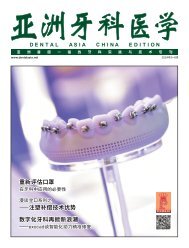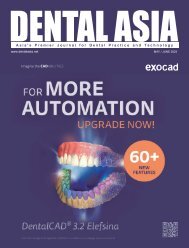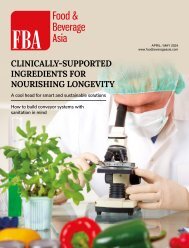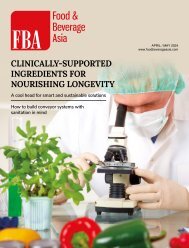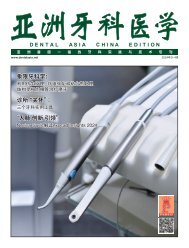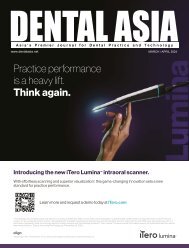Dental Asia May/June 2018
For more than two decades, Dental Asia is the premium journal in linking dental innovators and manufacturers to its rightful audience. We devote ourselves in showcasing the latest dental technology and share evidence-based clinical philosophies to serve as an educational platform to dental professionals. Our combined portfolio of print and digital media also allows us to reach a wider market and secure our position as the leading dental media in the Asia Pacific region while facilitating global interactions among our readers.
For more than two decades, Dental Asia is the premium journal in linking dental innovators
and manufacturers to its rightful audience. We devote ourselves in showcasing the latest dental technology and share evidence-based clinical philosophies to serve as an educational platform to dental professionals. Our combined portfolio of print and digital media also allows us to reach a wider market and secure our position as the leading dental media in the Asia Pacific region while facilitating global interactions among our readers.
- No tags were found...
You also want an ePaper? Increase the reach of your titles
YUMPU automatically turns print PDFs into web optimized ePapers that Google loves.
<strong>Dental</strong> Prole<br />
Personalising<br />
Dentistry<br />
Interviewed and written by Dr. Chala R. Platon<br />
Despite advances in dentistry<br />
and dental hygiene, many<br />
people still do not have good<br />
periodontal health. Most<br />
patients are not aware that<br />
they have gum problems and some even<br />
think bleeding gums during brushing and<br />
flossing are normal. On the contrary, it<br />
is actually an early sign of gum problems<br />
which can later on lead to periodontitis<br />
(gum diseases/periodontal disease). Read<br />
on to find out more about periodontal<br />
h e a l t h i n D e n t a l A s i a ’ s i n t e r v i e w w i t h<br />
Dr. Angelo Mariotti, a periodontal specialist<br />
and speaker at IDEM <strong>2018</strong>.<br />
Dr. Angelo Mariotti received his<br />
Ph.D. in Pharmacology and Toxicology<br />
including his Doctor of <strong>Dental</strong> Surgery from<br />
West Virginia University. He later on obtained<br />
his speciality training in Periodontology<br />
from Virginia Commonwealth University.<br />
He is currently Professor and Chair of<br />
t h e d i v i s i o n o f P e r i o d o n t o l o g y a t<br />
Ohio State University. Dr. Mariotti is also a<br />
member of the Council on Scientic Aairs<br />
for the American <strong>Dental</strong> Association, on<br />
the Advisory Board for the Journal of<br />
Periodontology and Clinical Advances in<br />
Periodontics and an editor for Pharmacology<br />
and Therapeutics for Dentistry.<br />
Enjoying his craft<br />
In addition to his research and teaching,<br />
Dr. Mariotti still finds time to maintain<br />
his private practice. This clearly shows his<br />
passion and dedication to his work. He nds<br />
Periodontology (periodontics) fascinating<br />
- the disease and research process, the<br />
therapeutic components (surgical and<br />
non-surgical) and developing relationships<br />
with patients throughout the course of<br />
treatment.<br />
Dr. Mariotti treasures these connections,<br />
as due to the regular check-ups needed<br />
in treating periodontal disease, he sees<br />
patients regularly for a number of years in<br />
order to monitor and stabilise his patient’s<br />
condition.<br />
“The thing that I really enjoy about my<br />
specialty is having a research component<br />
to explore the disease progression and<br />
treatment options related to the disease. I<br />
like the fact that in patient treatment I’ve<br />
had patients in my practice for decades<br />
that become like family to me. It’s pleasant<br />
to see people and develop friendships and<br />
this is the positive aspect of it all,” said<br />
Dr. Mariotti.<br />
Dr. Mariotti appreciates and enjoys what<br />
he does and couldn’t imagine doing any<br />
other specialisation besides periodontics,<br />
which he describes as both unique and<br />
delightful.<br />
Making use of his expertise<br />
A background in pharmacology has<br />
proven useful in treating his patients.<br />
Originally trained as a male reproductive<br />
pharmacologist, Dr. Mariotti has extensive<br />
knowledge on the signicant and related<br />
effects of steroid hormones on the<br />
periodontium and gingiva for both men and<br />
women. In fact, Dr. Mariotti was an editor<br />
for an issue of Periodontology 2000 in 2013<br />
that dealt with reproductive hormones and<br />
their eects in the periodontium.<br />
Dr. Mariotti mentioned that there are<br />
bone-sparing drugs (like Fosamax and<br />
Zometa) that may cause lesions in the<br />
oral cavity. Some patients might be taking<br />
these medications for osteoporosis or<br />
for some type of bone cancer in dierent<br />
concentrations.<br />
“Steroid hormones definitely have a<br />
signicant eect in the oral cavity. Having<br />
this knowledge and a pharmacology<br />
background helps me bring to light both<br />
the benets and risks of medications and<br />
treatments whenever I give patient care<br />
instructions or advice because I have a very<br />
rm understanding of how it aects their<br />
dental treatment,” explained Dr. Mariotti.<br />
Promoting awareness<br />
In the U.S. where Dr. Mariotti is based,<br />
he admits that it is very difficult to get<br />
patients to understand periodontal disease.<br />
Generally speaking, periodontal disease<br />
causes no pain at times. Often patients<br />
discover that they have periodontal<br />
disease already in its aggressive or<br />
latter stages. There are certain types of<br />
periodontal disease that cause pain like<br />
Acute Necrotising Ulcerative Gingivitis (ANUG)<br />
and periodontal abscess but these are not<br />
necessarily the most common forms of<br />
the disease. Moreover, people who have<br />
gingivitis and chronic periodontitis even<br />
the aggressive forms sometimes feel little<br />
to no discomfort.<br />
“Since some patients don’t visit<br />
dentists and have regular check-ups, giving<br />
32 DENTAL ASIA<br />
MAY / JUNE <strong>2018</strong>




